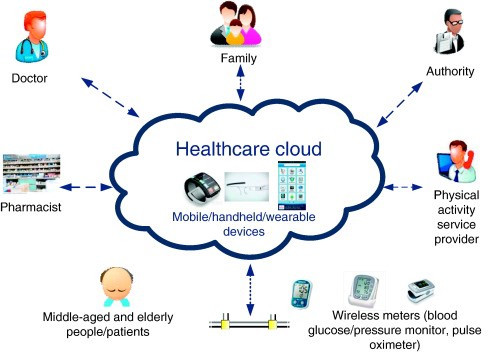What is Cloud Computing in Healthcare?
What is Cloud Computing in Healthcare?
20 May 2022
Cloud computing for the healthcare industry is the way of implementing remote server access through the internet for storing, managing, and processing healthcare data. In this process, on-site data centers aren’t established for hosting data on personal computers and hence provides a flexible solution for healthcare stakeholders to remotely access servers where the data is hosted.
Shifting to the cloud has two-fold benefits for both patients and providers. On the business side, virtualization in cloud computing has been beneficial to lower the operational spend while enabling healthcare providers to deliver high-quality and personalized care.
The patients, on the other hand, are getting accustomed with fast delivery of the healthcare services. Healthcare cloud computing increases involvement of patients by giving them access to their healthcare data, which ultimately results in better patient outcomes.
The remote accessibility of healthcare added with the democratization of data free the providers and patients which breaks down the location barriers to healthcare access.
What are the Benefits of Cloud Computing in the Healthcare Industry?
- Cost-effective solution:The primary premise of healthcare cloud services is real time availability of computer resources such as data storage and computing power. Both healthcare providers and hospitals don’t need to buy data storage hardware and software. Moreover, there are no upfront charges linked with the cloud for healthcare, they will only have to pay for the resource they actually use.
Applications of cloud computing in healthcare provides an optimum environment for scaling without paying much. With the patient’s data coming from not only EMRs but also through healthcare apps and wearables, a cloud environment makes it possible to scale the storage while keeping the costs low.
- Easy interoperability: Interoperability is establishing data integrations through the entire healthcare system, regardless of the origin or where the data is stored. Interoperability powered by healthcare cloud solutions, makes patients’ data available to easily distribute and get insights to aid healthcare delivery.
Healthcare cloud computing enables healthcare providers in gaining access to patient data gathered from multiple sources, share it with key stakeholders and deliver timely protocols.
- Ownership of data by patients:The combination of cloud computing and healthcare democratize data and give the patients control over their health. It increases participation of patients in decisions related to their health, working as a tool to better patient involvement and education.
The importance of cloud computing in the industry can also be seen by the fact that the medical data can be archived and then retrieved easily when the data is stored on the cloud. With an increase in the system uptime, the redundant data reduces to a huge extent, and the data recovery also becomes easier.
- Improved collaboration:The implementation of cloud for healthcare has a major role in boosting collaboration. By storing the Electronic Medical Records in the cloud, patients don’t need to have separate medical records for every doctor visit. The doctors can easily view the information, see the outcome of previous interactions with the specialists, and even share information with each other. This saves their time and enables them to provide more accurate treatment.
- Enhanced patient experience:With the help of cloud for healthcare, doctors have now the power to increase the patient involvement by giving them anytime access anywhere to medical data, test results, and even doctors’ notes. This gives the patients control over their health as they become more educated regarding their medical conditions.
In addition to this, cloud computing in healthcare provides a check for the patients from being overprescribed or dragged into unnecessary testing as doctors can find in the medical records.


